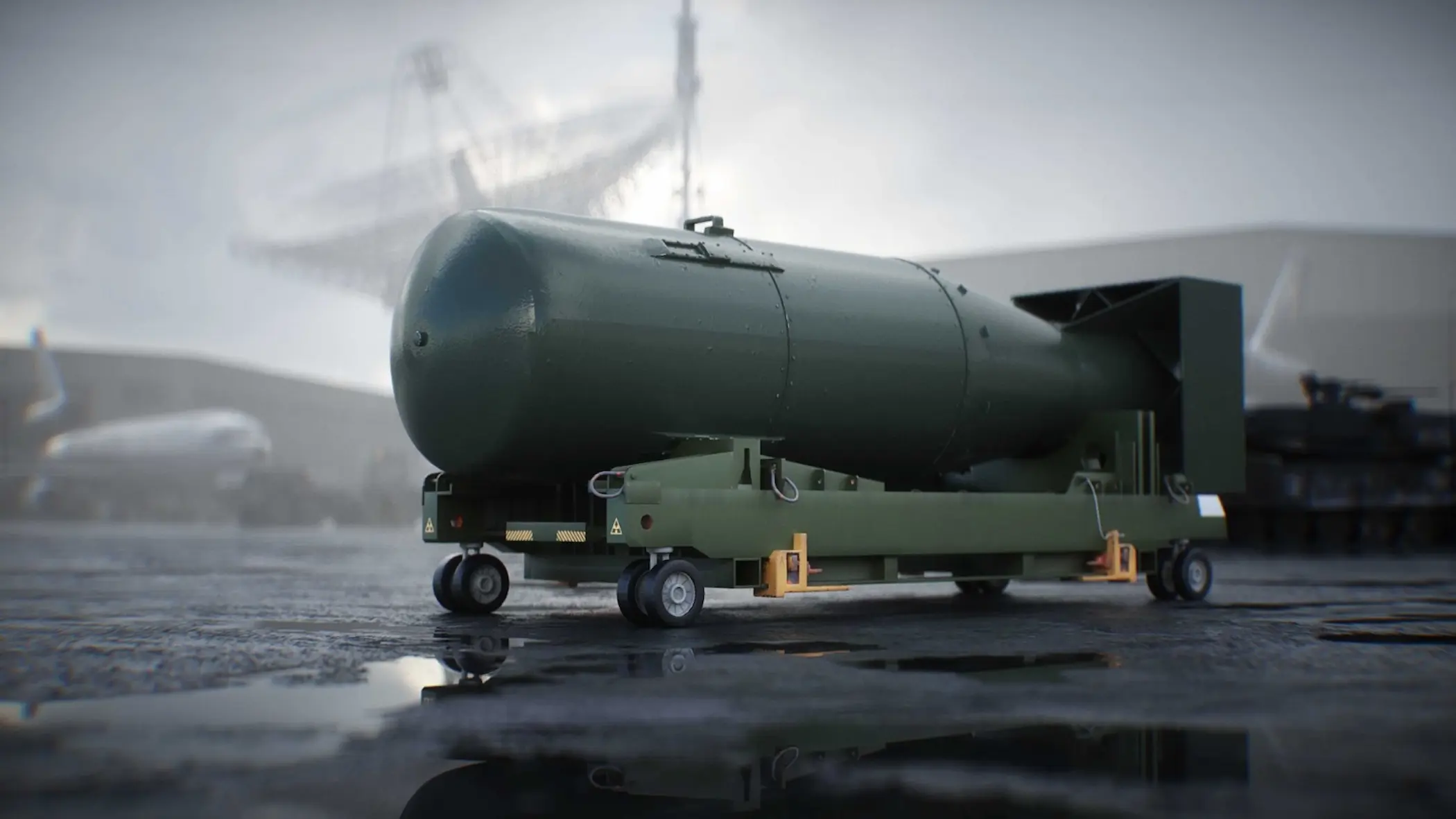10 Nov 2025
What If: The Next Power Race Is for Data, Not Land?
The race for global dominance is no longer fought over land, oil, or military might, it is rapidly unfolding in the realm of data. Across the world, governments are fortifying their digital borders, investing in surveillance technologies, and rewriting laws to claim ownership over the information flowing through their networks.
What emerges is a contest not for territory but for control over the data that defines modern life, who produces it, who stores it, and who decides how it is used. This silent power race is redrawing the global order, creating new hierarchies of influence built on algorithms and infrastructure rather than armies. As states weaponise information, the battle for sovereignty is shifting from physical borders to the digital terrain of human behaviour.
7 Nov 2025
The Obsolescense of the Nuclear World Order and the Emergence of Genome Editing
The global world order is based on a solid, yet fragile foundation. While it is solid for being intact for decades with systems and organisations built around it, its fragility stems from the inability to predict the reason that will one day blow it up. Nuclear weapons constitute a cornerstone in this world order; those who possess the fatal weapon, “the nuclear bomb,” among other capabilities, are the ones who dictate the rules of the game. What is important to ask now is: with the huge advancements in science taking place every day, will nuclear weapons become obsolete?
Scientists have discovered ways of genome editing by which cells negatively affected by ionized radiation can be detected, repaired, and even engineered to become immune to radiation entirely. This raises profound uncertainties about the future. If the destructive power of nuclear weapons can be neutralized at the biological level, the foundation of nuclear dominance may begin to erode. This leaves us facing a series of difficult questions. Would the traditional leverage of nuclear powers still hold? If weapons of mass destruction (WMD) lose their strategic value, will a new form of deterrence take shape, or will the very concept of deterrence fade? Who might emerge as the next global power, and by what tools or technologies will influence be asserted? And perhaps most importantly: would today’s nuclear states allow such a transformation, or resist it fiercely to preserve their status?
3 Nov 2025
Digital Cognitive Twins: The Hidden Face of the Data War
Simulation technology is witnessing a profound transformation with the emergence of Digital Cognitive Twins (DCTs), the next generation of Traditional Digital Twins (DTs). These advanced systems go beyond conventional monitoring functions, integrating sophisticated AI models, particularly machine learning networks and natural language processing (NLP) techniques.
This convergence grants DCTs complex capabilities, enabling them to perform autonomous decision-making, conduct real-time self-optimisation, and develop predictive and anticipatory mechanisms. As a result, this technology is reshaping key sectors across multiple domains. In Industry 4.0, it enhances the efficiency and resilience of logistical supply chains; in urban governance, it enables the intelligent management of resources with exceptional accuracy; and in the healthcare sector, it accelerates the adoption of precision medicine tailored to the individual.
The exceptional performance of these systems depends on their ability to absorb and aggregate vast datasets, comprising thousands of variables for a single individual. These datasets extend well beyond the conventional boundaries of personal information, encompassing biometric inputs, genomic data, clinical records, and continuous monitoring of behavioural and psychological patterns derived from digital interactions.
This aggregation produces human simulation models of exceptional fidelity, a defining feature that places this technology squarely within the dual-use domain. While these models promise vast societal benefits, the compromise or seizure of these composite data repositories would constitute a catastrophic national security threat: the harm arising from the exposure of citizens’ data would be strategic, permanent, and irreparable.
The gravest risk lies in the possibility that state or non-state actors might exploit these datasets. Whereas past influence operations—most notably the disinformation campaigns of the last decade—targeted broad audiences, behavioural models derived from integrated digital-transformation processes enable bespoke cognitive-warfare interventions at the level of individuals or small groups. This capability transcends conventional geopolitical forecasting, enabling real-time prediction of societal behaviour.
At the core of the threat is the capacity to selectively manipulate these datasets or even fabricate synthetic records to engineer a pretext for intervention. By corrupting cognitive models, an adversary can simulate a manufactured state of public unrest, precipitate mass psychological collapse, or stage apparent systemic institutional failure—thereby manufacturing a spurious justification for political, economic or security interventions.
30 Oct 2025
Embryo Futures: Life Without Eggs or Sperm
In a world where reproduction no longer requires bond, lineage, or even
parents, humanity has severed its oldest bond: the family. By 2070, governments no longer wait
for couples to conceive, they manufacture life in humming factories of glass and steel, raising
entire generations in artificial wombs. Children emerge without mothers or fathers, only the state
and its machines.
Embryo Futures: Life Without Eggs or Sperm, a story from AHRC’s Futures Imagined series,
envisions a tomorrow where population decline is met not with reform but with replacement. At
once a tale of survival and of loss, it asks what becomes of identity, belonging, and love when
society decides that human roots are optional.
Futures Imagined is a publication exploring emerging trends through imaginative forecasting. Rather than relying on strict methodologies, this piece invites AHRC writers to creatively narrate a possible future reality shaped by current developments.
20 Oct 2025
The Ozempic Shockwave: How Is One Drug Impacting Global Food and Insurance Systems?
The worldwide rise of semaglutide—a marketed formulation under different names, most notably Ozempic—is occurring rapidly and in various ways. Since its initial approval for type 2 diabetes, Semaglutide has quickly adapted to drive changes in personal health behaviours, market dynamics, and healthcare policy priorities. The drug operates through a complex mechanism that alters the body’s appetite and metabolism, leading to the transformation. As a result, there is a widening divergence between its regulatory objective and a growing use as a weight loss tool.
The disconnect is not just clinical but a systemic coming together of prevalent cultural norms, insurance structures, pharmaceutical supply chains and global consumer trends. The increasing use of Semaglutide across different social classes and countries gives rise to important political economy challenges regarding the price of the therapy, access to it and the sustainability of national health systems.
This analysis examines semaglutide’s disruptive evolution from a drug invention to a global public health tool. The analysis focuses on the situation in the United States (U.S.), but it also examines future possibilities where affordability and scale could make the drug essential in combating obesity and metabolic disease.
30 Sep 2025
An Unequal Cost: How Space Debris Deepens the Exclusion of Developing Nations from the Economies of the Future
Since the launch of the first satellite in 1957, the Low Earth Orbit (LEO) has undergone a profound transformation from a near-empty frontier into a congested and polluted environment shaped by decades of human activity. Non-functional satellites, spent rocket stages, and fragmentation debris from collisions and explosions have accumulated to a mass exceeding 14,700 tons. Critical events have amplified the scale of the problem, most notably China’s Anti-Satellite Test (ASAT) in 2007 and the 2009 collision between the U.S. Iridium-33 and Russia’s Kosmos-2251, which together generated nearly one-third of all catalogued debris in LEO.
This material is unevenly distributed but highly concentrated between 750 and 1,000 kilometres, an orbital belt central to Earth Observation and communications. Objects in this altitude range can persist for centuries, while in the Geostationary Orbit (GEO) debris may remain indefinitely, underscoring the long-term persistence of the hazard. Consequently, orbital space has shifted from an open frontier to a finite and polluted resource requiring collective governance.
This study examines the economic and political dimensions of space debris. It assesses the direct costs borne by operators, the cascading risks to terrestrial infrastructure such as Global Navigation Satellite Systems (GNSS) and weather forecasting, and the disproportionate challenges facing developing nations. It concludes by analysing potential responses, ranging from mitigation strategies to Active Debris Removal (ADR), within the broader framework of international governance and global equity.
29 Sep 2025
Pulse: Arabic Language and Regional Security
This Pulse survey, conducted in August 2025, examines public perceptions of the Arabic language and its role in shaping regional identity, security, and cohesion. The findings shed light on how populations view the weakening of Arabic as a potential threat, not only to cultural and social unity, but also to economic stability and national security. By exploring both immediate and long-term concerns, the survey provides valuable insights into how language is perceived as a pillar of resilience in the Arab world.
26 Sep 2025
The Global Economic Impacts of Starlink Outages: From Operational Fragility to Pathways of Resilience
In recent years, Low Earth Orbit (LEO) satellite constellations have emerged as a transformative layer within the global digital infrastructure, marking a departure from their original role as connectivity solutions for remote regions. These systems are now embedded within the operational cores of critical sectors such as civil aviation, maritime logistics, financial markets, and defence. The clearest manifestation of this structural shift is Starlink, operated by SpaceX, which by mid-2025 had exceeded 7 million users across more than 150 countries, with exponential growth rates in high-value, latency-sensitive industries.
This rapid technological and geographical expansion has positioned Starlink as a globally integrated utility—yet one that operates outside conventional regulatory regimes. It represents a structural concentration of control over global data flows in a single, privately held entity. The dual outages that occurred in July and September 2025 exposed deep systemic vulnerabilities within the Starlink network, including software architecture fragilities and environmental sensitivities to space weather events. These incidents prompted urgent questions about the stability of a critical infrastructure layer that now underpins sectors central to national sovereignty and global economic coordination.
This report interrogates the systemic risks embedded in the global economy’s growing dependence on LEO constellations through two interlinked analytical lenses. The first is a technical-political economy perspective, which examines the underlying architecture of the Starlink network and the typology of its failure modes—both endogenous and exogenous. The second is a forward-looking, scenario-based assessment that models the potential global economic consequences of a 24-hour Starlink outage in 2032. Through this dual approach, the analysis traces the contours of a new strategic dilemma: how to govern an emergent, transnational infrastructure whose failure could trigger multi-sectoral crises at planetary scale, yet whose design and control remain entirely privatized.
25 Sep 2025
UAE’s New Trade Bloc: Ambition, Global Positioning, and Challenges
The United Arab Emirates (UAE) is intending to establish a new trade bloc, a strategic and interconnected initiative aimed at achieving multiple goals on both the national and the international level. This trade block should not be interpreted in isolation, rather as part of the UAE’s wider economic and geopolitical strategy, which reflects the changing and evolving dynamics of the global trade landscape.
In a fragmented globalization era, where competition and integration attempt significantly increase between the regional trade networks and the multilateral systems, the UAE is poised to maintain its influence and relevance by positioning itself at the forefront of the global landscape. This approach will benefit the UAE on different levels, including advancing domestic priorities while simultaneously enhancing its leverage within the evolving global economic power. Nevertheless, the bloc’s success is not completely guaranteed, as it will need to navigate significant regulatory, infrastructural, and political barriers to translate its potentiality into tangible outcomes.
22 Sep 2025
Seasteading: Radical Vision or Dystopian Future?
The idea of building floating cities at sea has long drifted between science fiction fantasy and Silicon Valley ambition, but in the late 2000s it developed into a real-world project known as seasteading. Presented as a bold libertarian experiment, it promised an escape from taxes, governments, and regulations, offering wealthy backers the chance to create new societies beyond the reach of any state. For its supporters, this was not about fixing broken systems but about starting from scratch in international waters, rewriting the rules in the name of freedom, innovation, and limitless possibility.
Yet as this idea edges closer to reality, the questions it raises grow more urgent: who are these new societies really for, and who will inevitably be excluded? In a world already marked by widening inequality and an accelerating climate crisis, floating cities may not look like visions of the future so much as warnings about the present.
18 Sep 2025
Emotion in the Machine: Economic Gains vs. Security Concerns
The rapid evolution of artificial intelligence, propelled by transformer models like OpenAI’s ChatGPT, has reshaped industries and redefined human–machine collaboration. Beyond generating language, AI now powers psychological assessments, financial sentiment analysis, and synthetic empathy—making emotional intelligence a critical asset. Within this shift, emotional audio intelligence has emerged as especially strategic, enabling machines to both recognize affective states and reproduce them in synthetic voices. Meta’s 2025 acquisition of WaveForms AI reflects this trend, securing early control over “programmable affect” and underscoring both the economic promise and geopolitical risks of affective computing. By turning AI from a diagnostic tool into a simulation system, the deal positions Meta to create digital agents capable of projecting warmth, urgency, or reassurance—reshaping the future of human–machine interaction.
Meta’s 2025 acquisition of WaveForms AI marks a turning point in artificial intelligence: the rise of emotionally intelligent audio as both an economic opportunity and a national security risk. AI has evolved rapidly, propelled by transformer models like OpenAI’s ChatGPT, and now extends far beyond language generation. From psychological assessment to financial sentiment analysis, its ability to interpret emotions has become a critical asset. Emotional audio intelligence pushes this further by enabling machines not only to recognize affective states but also to reproduce them in synthetic voices. With WaveForms, Meta secures early control over this capability—transforming AI from a diagnostic tool into a simulation system, capable of projecting warmth, urgency, or reassurance in ways that could redefine human–machine interaction.
24 Aug 2025
How AI Will Reshape, Not Ruin, Stability
As enthusiasm for Artificial Intelligence (AI) grows each day, so too does anxiety about its potential impact on jobs and overall societal stability. Several studies highlight the possibility that full automation could disrupt economic and political systems. While these concerns are valid and should not be dismissed, it is important to remember that, like any other transformative technology, AI can be both celebrated for its potential and feared for its risks.
A stable society cannot function without a labour force; removing it entirely would violate basic economic principles such as supply and demand, while also undermining political stability, which depends on the resilience of the middle class. These structural realities suggest that, rather than erasing human work altogether, AI will likely be both automatically and deliberately integrated in ways that preserve social and economic balance. From this perspective, the future shaped by AI is not as dire as some anticipate.











